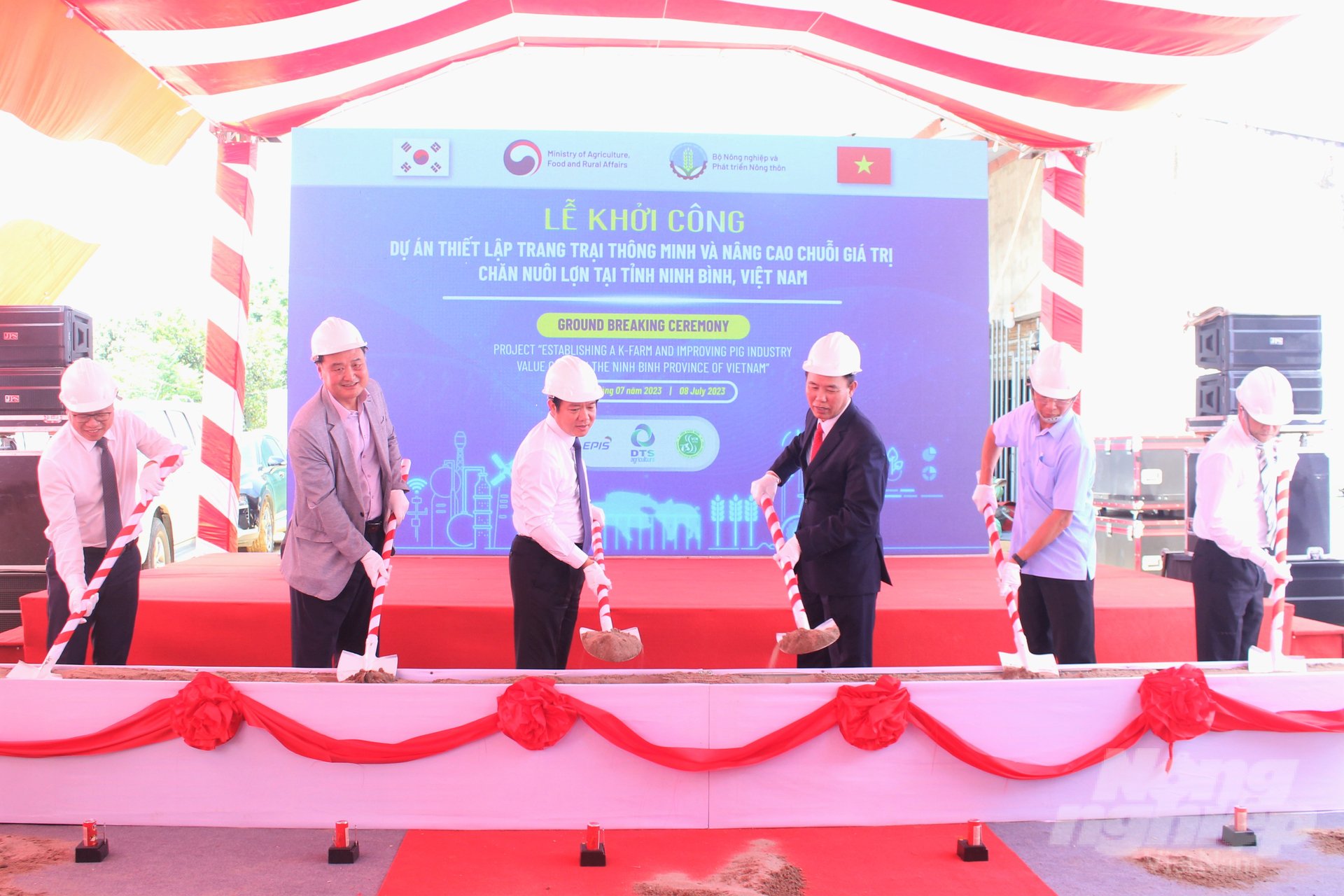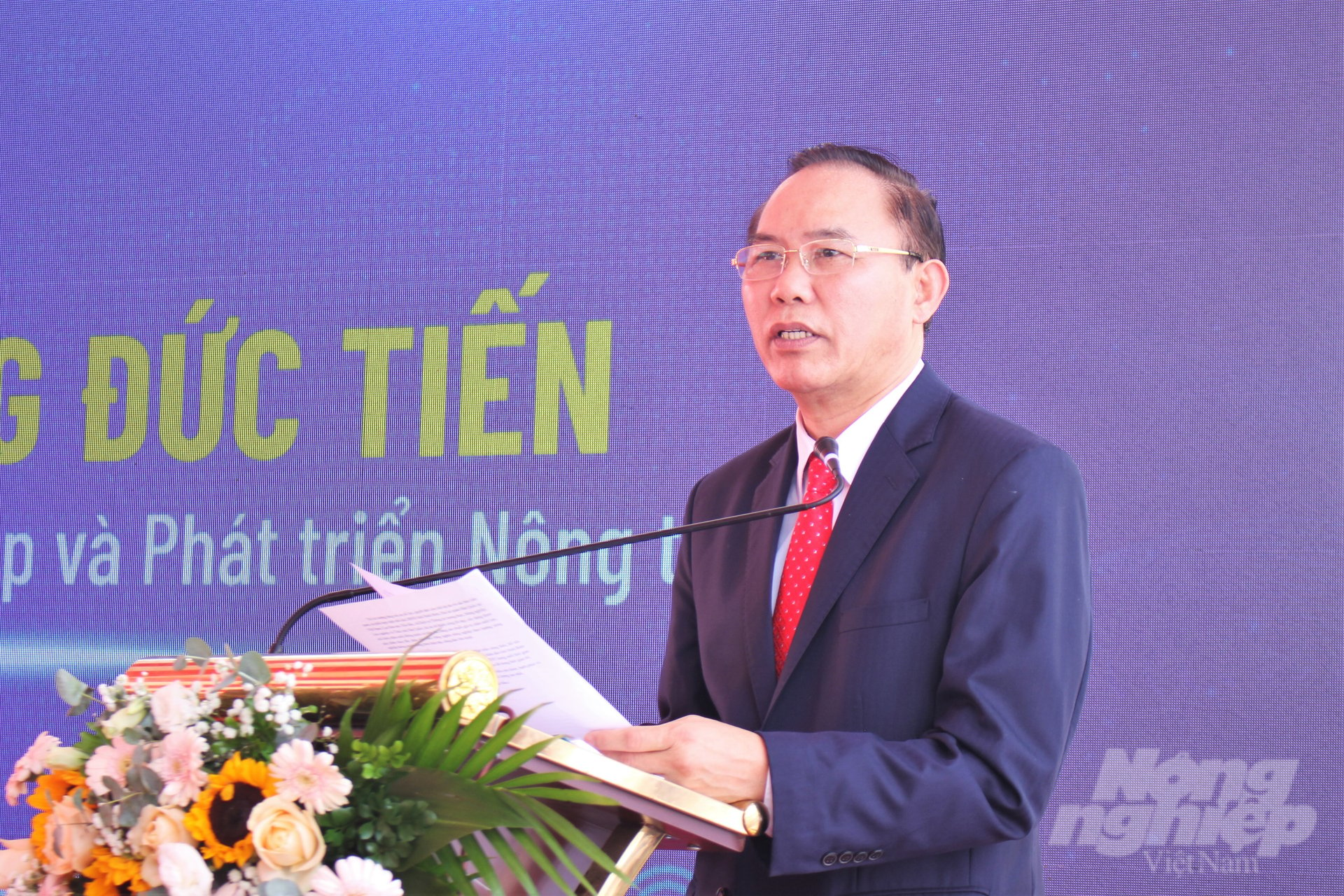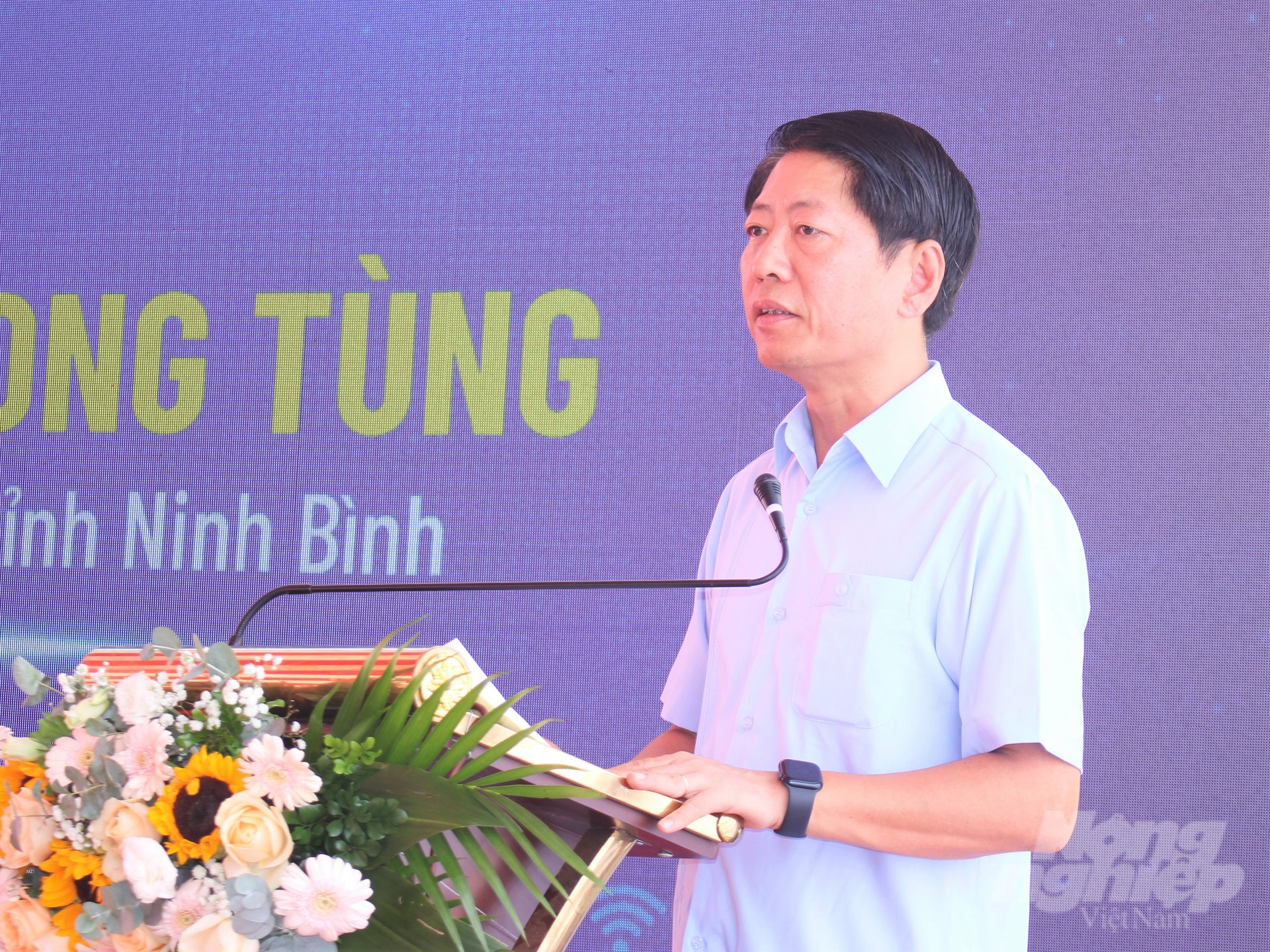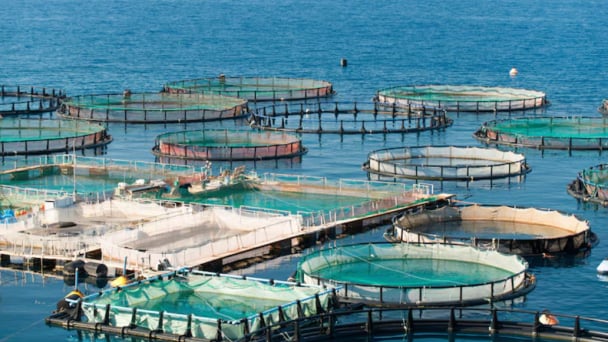June 5, 2025 | 12:50 GMT +7
June 5, 2025 | 12:50 GMT +7
Hotline: 0913.378.918
June 5, 2025 | 12:50 GMT +7
Hotline: 0913.378.918
The MARD, in collaboration with the Ministry of Agriculture, Food, and Rural Affairs of the Republic of Korea, organized "The Construction Commencement Ceremony for the Project on Establishing a Smart Farm and Strengthening the Pig Farming Value Chain in Ninh Binh".

Delegates broke ground on Project on Establishing a Smart Farm and Strengthening the Pig Farming Value Chain in Ninh Binh. Photo: Trung Quan.
The project will be carried out in Hanoi and Ninh Binh between 2022 and 2025 with a grant from the Republic of Korea's government totaling 3,1 million USD. The Center for Digital Transformation and Agricultural Statistics has been designated as the project administrator by the Ministry of Agriculture and Rural Development.
Director of the Center for Digital Transformation and Agricultural Statistics Nguyen Quoc Toan stated that the initiative was implemented at the Tam Diep nuclear pig breed research and development station in Tam Diep City (Ninh Binh).
Through the project, the two parties will collaborate to construct a demonstration model of a smart pig-breeding farm in Ninh Binh province, utilizing cutting-edge technology to guarantee the utmost quality of products for domestic consumption and export.
Through the project's Korean experts, advanced techniques from the Korean clever pig husbandry model will be transferred and implemented in Vietnam. Staff and producers involved in the initiative will have their livestock production, disease control, goods circulation, and data management capabilities enhanced.
On this premise, the project will be executed with the following five components: Installing a clever pig farm model (216m2 of sow barns and over 467m2 of pig houses), developing a clever farm operating software system, supplying vaccines, breeding piglets, and breeding materials; Training and technology transfer (domestic and international) on high-tech livestock, data administration, and the operation of intelligent agricultural systems; Develop strategic reports and master plans for smart pig farm development, market connectivity, communication, promotion, and sharing of project activities and products.

Mr. Nguyen Quoc Toan, Director of the Center for Digital Transformation and Agricultural Statistics, informed delegates about the project. Photo: Trung Quan.
Phung Duc Tien, Deputy Minister of Agriculture and Rural Development, stated that after more than 30 years of diplomatic relations, the Government of Vietnam and the Government of the Republic of Korea have agreed to sign and implement the "Action Program" to implement the comprehensive strategic partnership between Vietnam and Korea during the State visit of Korean President Yoon Suk Yeol to Vietnam in June.
It is evident from the content of the "Action Program" that the two parties will increase their cooperation in the sharing of experience in the development of high-tech agriculture, intelligent agriculture, preservation, and post-harvest processing industries. Promote the effective implementation of the Memorandum of Understanding in the agriculture and rural development sector.
Continue to support technology and cooperate in the production, processing, distribution, and consumption processes in order to promote trade for agricultural products and commodities processed from agriculture and fishery, which are the two countries comparative advantages. Improve the integrity of Vietnam's agricultural and livestock products at the same time.

Deputy Minister of Agriculture and Rural Development Phung Duc Tien expects the project to create a typical clean agricultural product production and consumption model, with high competitiveness, increasing income for farmers. Photo: Trung Quan.
According to Deputy Minister Phung Duc Tien, the document of the 13th Party Congress on agricultural development emphasized the elements of science, technology, and innovation, with an emphasis on capitalizing on the achievements of the fourth industrial revolution and enhancing the adaptability of agriculture to climate change.
The year 2023 is of great importance, as it marks the second year of implementing the Resolution of the 5th Central Committee (term XIII) on agriculture, farmers, and rural areas, the third year of implementing the Resolution of the 13th Party Congress, and the middle of implementing the Five-year plan (2021-2025).
Cost-effective and methodical investment in the wise agricultural production model with modern information technology applications has not yet occurred. Consequently, it is anticipated that this project will establish a typical, highly competitive, environmentally friendly model for the production and consumption of agricultural products, thereby contributing significantly to the economic development of the agricultural sector in general and the livestock sector in particular.
On that basis, the Deputy Minister requested the Center for Digital Transformation and Agricultural Statistics, the Institute of Livestock Production to closely coordinate with the authorities of Ninh Binh province and the Department of Training, Promotion and Information Services for Food, Agriculture, Forestry and Fisheries (under the Ministry of Agriculture, Food and Rural Affairs of Korea), relevant agencies organize the implementation of the project to ensure quality, efficiency, in accordance with the following contents. for which the project document has been approved.
In addition, coordinate with Ministry units such as the Department of Science, Technology, and Environment, the Department of Livestock Production, and the Department of Animal Health to study and propose policies and master plans to improve the smart pig farming model and increase the value chain of pig farming in Ninh Binh province in particular and throughout the country.

According to Mr. Tran Song Tung, Vice Chairman of Ninh Binh Provincial People's Committee, Ninh Binh Province will create all favorable conditions for the project to be implemented as planned. Photo: Trung Quan.
It is essential for agencies under the Ministry of Agriculture and Rural Development to regularly urge, monitor, supervise, evaluate, and accept project results in accordance with their designated functions and responsibilities, thereby ensuring the efficient use of non-reimbursable government aids.
The Deputy Minister also requested that the provincial authorities of Ninh Binh support and establish favorable conditions for project proprietors, experts, and construction contractors to adhere to the predetermined schedule and quality.
Translated by Linh Linh

(VAN) Technology is redrawing the map of Vietnamese aquaculture: more modern, greener, and more sustainable.

(VAN) Novel process harnesses machine learning to reveal groups of genes that determine how efficiently plants use nitrogen.

(VAN) Several scientists and farmers are experimenting with soil treatment in some key durian-growing regions such as Cai Lay (Tien Giang), Dak Song, Gia Nghia, and Dak R’lap (Dak Nong).
/2025/05/25/4127-3-073637_820.jpg)
(VAN) Thanks to the promotion from an FAO-implemented project, vegetable production in greenhouses in Moc Chau has seen strong development, from 1.5 hectares in 2021 to nearly 50 hectares in 2024.

(VAN) FAO has recently supported USD 140,000 to implement the project 'Risk mitigation human-animal interface risks through disease control initiatives in pig farming.'

(VAN) The People's Committee of Tra Vinh province has approved an adjustment to the investment policy for the Green Hydrogen Plant project, increasing its area to approximately 52.76 hectares.
![Reducing emissions from rice fields: [2] Farmers’ commitment to the soil](https://t.ex-cdn.com/nongnghiepmoitruong.vn/608w/files/news/2025/05/05/dsc08881jpg-nongnghiep-140632.jpg)
(VAN) Clean rice cultivation model in Thuong Tan commune, Bac Tan Uyen district, is assisting local residents in achieving sustainable agriculture by substantially reducing costs, increasing productivity, and protecting the environment.